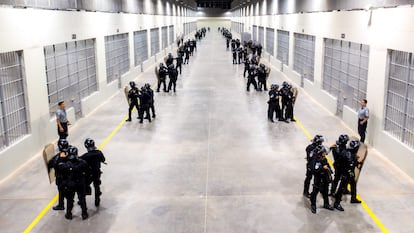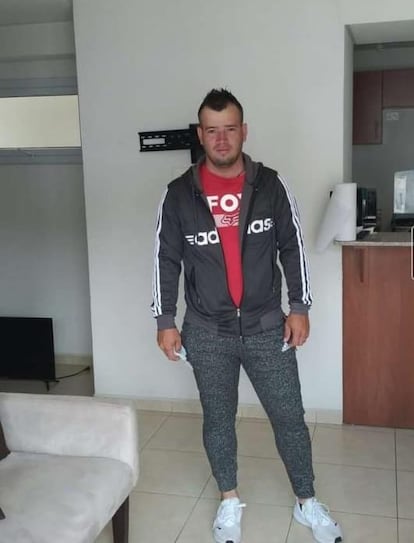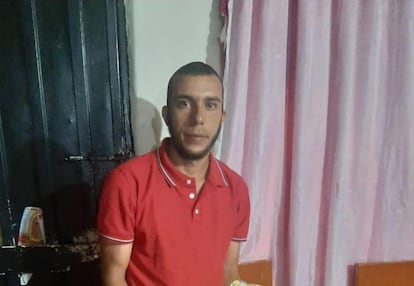The Colombians imprisoned in Bukele’s inferno
Mothers, sisters and wives of at least 35 unjustly detained people in El Salvador ask the government of Gustavo Petro to help them guarantee the human rights of their relatives


Claudia Marcela Colpas has not heard from her son Brandon Loaiza since February 14, 2023 at half past six in the morning, when she spoke to him for the last time. Not a call, not a text message, not an email. Nothing in the almost six months he has been imprisoned and incommunicado in El Salvador, in one of the prisons of Nayib Bukele’s regime. “That day he asked me for my blessing, told me he was going to work and said goodbye,” recalls Claudia Marcela in a dialogue with EL PAÍS.
Brandon, 19, left his house on a motorcycle with another Colombian companion, got into an accident, and while they were agreeing to pay damages to the person who had run them over, the police arrived. They were arrested, taken to a station and jailed for allegedly belonging to the dangerous Mara 18 gang, a lawyer from El Salvador who is handling her son’s case told Claudia Marcela. They were arrested with no arrest warrant, no criminal record, no prior investigation, no evidence.
The crime the two Colombians were charged with that day was that of being part of illicit groups. The same crime with which the Bukele regime has imprisoned more than 69,000 people in just 15 months since it decreed a state of emergency in March 2022. Ingrid Escobar, director of the El Salvador NGO Socorro Jurídico Humanitario, which is helping the families of the detainees, says that of the total number of prisoners in this time, at least 20,000 are innocent people. “There is a repeated violation of human rights of the Colombians imprisoned in El Salvador. We do not know exactly how many Colombians are detained, but more than 20 families have come to our organization asking for help. Many of those captured do not receive hygiene packages or food and are locked up in the same prisons with murderers, rapists, with real gang members,” Escobar explains by telephone. And he adds: “Bukele’s regime of exception has served to capture massively, but not to bring justice.

Claudia Marcela says that her son arrived on January 25 in the Central American country in search of a better future for him and his family. Seduced by the bitcoin, the apparent prosperity and the supposed return of security, Brandon left his job at the Club Campestre de Pereira to go get dollars in El Salvador. He had been there less than a month when he was captured. “They detained my son for being Colombian, for being poor and for having tattoos,” says Claudia Marcela sadly. “He has a small M tattooed on one of his hands, which is the initial of my name, that’s why they accused him of being a gang member.” She has tried by all means to find out how Brandón is doing, but it has been impossible to communicate with him. After many requests to the embassy, the foreign ministry and the Colombian consulate in El Salvador, she was told in an official response that the authorities of that country do not allow communications with those deprived of liberty. “The only thing I ask for, says Marcela, is proof of survival, a photo, a letter, to hear his voice again, to know that he is in good health, if he has been able to eat, if he is being humiliated or beaten”.
Erika Loaiza, sister of Felipe Gomez Loaiza, the other young Colombian who was captured on February 14, is currently experiencing the same anguish as Claudia Marcela. He is 31 years old, the father of two children, a one-year-old and a four-year-old, and arrived in El Salvador on December 22, 2022. “He left in search of better opportunities. A friend of his who lives there called him and told him that he was doing very well, that there was progress and that it was safe. He came with that illusion,” says Loaiza. Felipe lived in Cartago, Valle del Cauca, and worked as a farmer on a farm. In El Salvador he made a living from commerce, selling clothes and accessories, until the day he was captured. Like Brandon, he was accused of belonging to Mara 18. His family has not heard from him since that date. The tattoos he had, with the fingerprints, names and birth dates of his children, also worked against him. “Having tattoos doesn’t make them criminals,” Erika insists.
However, for the Bukele regime it seems that tattoos are proof of crimes. Beatriz Helena Muñoz, wife of Cristian David Corrales, another young Colombian arrested in El Salvador, denounced that in a Bukele newscast they had put a photo of her partner’s face full of fake tattoos to make him look like a criminal. “He doesn’t have any tattoos,” Beatriz denounced, while comparing the real photos of her husband with those on the cover of the newscast, which showed him as a gang member with tattoos all over his face. She also has not heard from Cristian since the day of his capture. “I am very anguished. We talked every day by video call. Now I don’t even know if he is alive,” she laments.

Beatriz Muñoz, Erika Loaiza and Claudia Marcela Colpas are three of the more than 35 mothers, wives and sisters of Colombians imprisoned in El Salvador who organized themselves to demand that Gustavo Petro’s government help them guarantee the human rights of their imprisoned relatives. In a letter, the women from different regions of Colombia, who until a few weeks ago did not know each other and now share a common tragedy, ask the president to intercede so that the authorities of El Salvador give them concrete answers about the status of their relatives. “We have not had any information from them for several days and when we ask for it, the embassy of El Salvador does not give it to us. For this reason we do not know if they are sick or alive at the moment”.
Their anguish intensifies every time they learn of the death of a prisoner in Bukele’s jails. According to the NGO Socorro Jurídico Humanitaria, 156 people have died in the 15 months of the state of emergency, 60% due to violence and 30% due to medical negligence. “In the last few days, two babies who were born in captivity have died because they were not attended”, denounces lawyer Escobar.
The signatories of the letter addressed to Petro state that none of their family members have a record in Colombia and that they are young workers. “They are being charged without having legal and/or juridical representation,” the document says. “Mr. President, we turn to you in the midst of our anguish. We are people of limited resources and we do not have the means to be able to travel to El Salvador, and to be able to have knowledge about the legal and health situation of our loved ones. For this reason we request that, through the Ministry of Foreign Affairs and the ambassador in El Salvador, you can take the necessary steps to find out the status of our family members”.
In the letter, supported by the organization El Salvador Patria Querida, the women announce that they will travel to Bogota to hold a sit-in in front of the embassy on July 11 and 12. “As we do not know anyone in the city of Bogota and we do not have relatives in the city, we would like to ask you very politely if you could help us get to the place and/or a shelter so we can spend the night with our relatives,” they ask the president.
In a brief response to questions from EL PAÍS, the Colombian Foreign Ministry explains that the consular mission “established contact with the Salvadoran judicial authorities to urge for the guarantee of due process, defense and respect for human rights within the framework of the Universal Declaration of Human Rights of the Colombians imprisoned in El Salvador”. The Ministry of Foreign Affairs, headed by Alvaro Leyva, also affirms that they have visited the detainees on several occasions and provided consular assistance and accompaniment to their families. The relatives deny this accompaniment and say that they feel abandoned by the government.
For now, the relatives of the Colombians imprisoned in El Salvador are only asking that they be treated with a minimum of dignity. The problem, recalls lawyer Ingrid Escobar, is that under Bukele’s exceptional regime, all the rights of the accused have been lost. “Here the right to due process is not guaranteed, nor the right to a hearing, nor the right to a fair trial, the presumption of innocence is not respected”. Escobar, who on July 15 will denounce Bukele’s human rights violations before the Inter-American Commission on Human Rights, assures that El Salvador’s judges “don’t even know how many Colombians they have in jail, supposedly for being gang members”. Most likely, he says, these young men will be free after a year when the prosecutor’s office does not find sufficient evidence to convict them. And he concludes: “The serious thing is that Bukele’s jails are centers of torture and death.
Sign up for our weekly newsletter to get more English-language news coverage from EL PAÍS USA Edition
Tu suscripción se está usando en otro dispositivo
¿Quieres añadir otro usuario a tu suscripción?
Si continúas leyendo en este dispositivo, no se podrá leer en el otro.
FlechaTu suscripción se está usando en otro dispositivo y solo puedes acceder a EL PAÍS desde un dispositivo a la vez.
Si quieres compartir tu cuenta, cambia tu suscripción a la modalidad Premium, así podrás añadir otro usuario. Cada uno accederá con su propia cuenta de email, lo que os permitirá personalizar vuestra experiencia en EL PAÍS.
¿Tienes una suscripción de empresa? Accede aquí para contratar más cuentas.
En el caso de no saber quién está usando tu cuenta, te recomendamos cambiar tu contraseña aquí.
Si decides continuar compartiendo tu cuenta, este mensaje se mostrará en tu dispositivo y en el de la otra persona que está usando tu cuenta de forma indefinida, afectando a tu experiencia de lectura. Puedes consultar aquí los términos y condiciones de la suscripción digital.








































